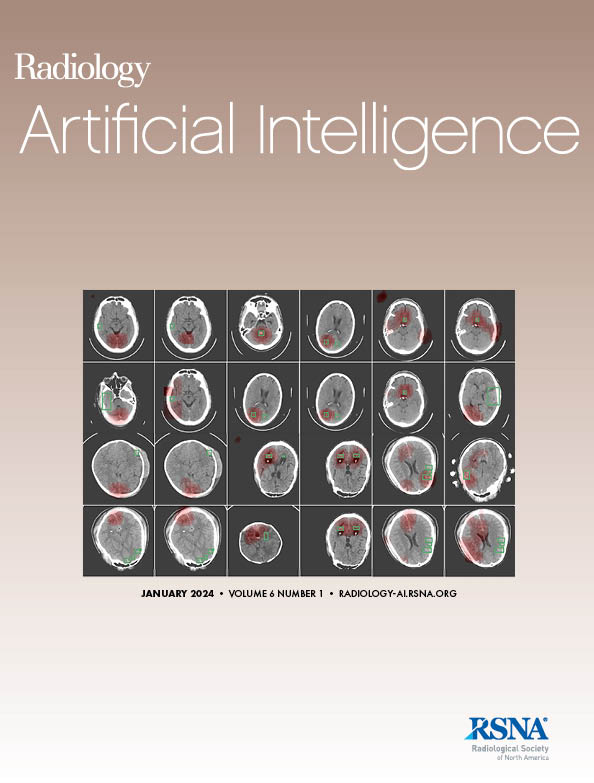下载PDF
{"title":"Radiomics Beyond the Hype: A Critical Evaluation Toward Oncologic Clinical Use.","authors":"Natally Horvat, Nikolaos Papanikolaou, Dow-Mu Koh","doi":"10.1148/ryai.230437","DOIUrl":null,"url":null,"abstract":"<p><p>Radiomics is a promising and fast-developing field within oncology that involves the mining of quantitative high-dimensional data from medical images. Radiomics has the potential to transform cancer management, whereby radiomics data can be used to aid early tumor characterization, prognosis, risk stratification, treatment planning, treatment response assessment, and surveillance. Nevertheless, certain challenges have delayed the clinical adoption and acceptability of radiomics in routine clinical practice. The objectives of this report are to (<i>a</i>) provide a perspective on the translational potential and potential impact of radiomics in oncology; (<i>b</i>) explore frequent challenges and mistakes in its derivation, encompassing study design, technical requirements, standardization, model reproducibility, transparency, data sharing, privacy concerns, quality control, as well as the complexity of multistep processes resulting in less radiologist-friendly interfaces; (<i>c</i>) discuss strategies to overcome these challenges and mistakes; and (<i>d</i>) propose measures to increase the clinical use and acceptability of radiomics, taking into account the different perspectives of patients, health care workers, and health care systems. <b>Keywords:</b> Radiomics, Oncology, Cancer Management, Artificial Intelligence © RSNA, 2024.</p>","PeriodicalId":29787,"journal":{"name":"Radiology-Artificial Intelligence","volume":" ","pages":"e230437"},"PeriodicalIF":8.1000,"publicationDate":"2024-07-01","publicationTypes":"Journal Article","fieldsOfStudy":null,"isOpenAccess":false,"openAccessPdf":"https://www.ncbi.nlm.nih.gov/pmc/articles/PMC11294952/pdf/","citationCount":"0","resultStr":null,"platform":"Semanticscholar","paperid":null,"PeriodicalName":"Radiology-Artificial Intelligence","FirstCategoryId":"1085","ListUrlMain":"https://doi.org/10.1148/ryai.230437","RegionNum":0,"RegionCategory":null,"ArticlePicture":[],"TitleCN":null,"AbstractTextCN":null,"PMCID":null,"EPubDate":"","PubModel":"","JCR":"Q1","JCRName":"COMPUTER SCIENCE, ARTIFICIAL INTELLIGENCE","Score":null,"Total":0}
引用次数: 0
引用
批量引用
Abstract
Radiomics is a promising and fast-developing field within oncology that involves the mining of quantitative high-dimensional data from medical images. Radiomics has the potential to transform cancer management, whereby radiomics data can be used to aid early tumor characterization, prognosis, risk stratification, treatment planning, treatment response assessment, and surveillance. Nevertheless, certain challenges have delayed the clinical adoption and acceptability of radiomics in routine clinical practice. The objectives of this report are to (a ) provide a perspective on the translational potential and potential impact of radiomics in oncology; (b ) explore frequent challenges and mistakes in its derivation, encompassing study design, technical requirements, standardization, model reproducibility, transparency, data sharing, privacy concerns, quality control, as well as the complexity of multistep processes resulting in less radiologist-friendly interfaces; (c ) discuss strategies to overcome these challenges and mistakes; and (d ) propose measures to increase the clinical use and acceptability of radiomics, taking into account the different perspectives of patients, health care workers, and health care systems. Keywords: Radiomics, Oncology, Cancer Management, Artificial Intelligence © RSNA, 2024.
eRadiomics 超越炒作:面向肿瘤临床应用的严格评估。
"刚刚接受 "的论文经过同行评审,已被接受在《放射学》上发表:人工智能》上发表。这篇文章在以最终版本发表之前,还将经过校对、排版和校对审核。请注意,在制作最终校对稿的过程中,可能会发现影响内容的错误。放射组学是肿瘤学中一个前景广阔、发展迅速的领域,涉及从医学影像中挖掘定量高维数据。放射组学具有改变癌症管理的潜力,放射组学数据可用于辅助早期肿瘤特征描述、预后判断、风险分层、治疗计划、治疗反应评估和监测等。然而,放射组学在常规临床实践中的临床应用和可接受性还面临着一些挑战。本报告的目的是(a) 展望放射组学在肿瘤学领域的转化潜力和潜在影响;(b) 探讨放射组学发展过程中经常遇到的挑战和失误,包括研究设计、技术要求、标准化、模型可重复性、透明度、数据共享、隐私问题、质量控制,以及多步骤流程的复杂性导致放射科医生界面不够友好;(c) 讨论克服这些挑战和错误的策略;以及 (d) 考虑到患者、医护人员和医疗系统的不同观点,提出提高放射组学临床应用和可接受性的措施。©RSNA,2024 年。
本文章由计算机程序翻译,如有差异,请以英文原文为准。

 求助内容:
求助内容: 应助结果提醒方式:
应助结果提醒方式:


